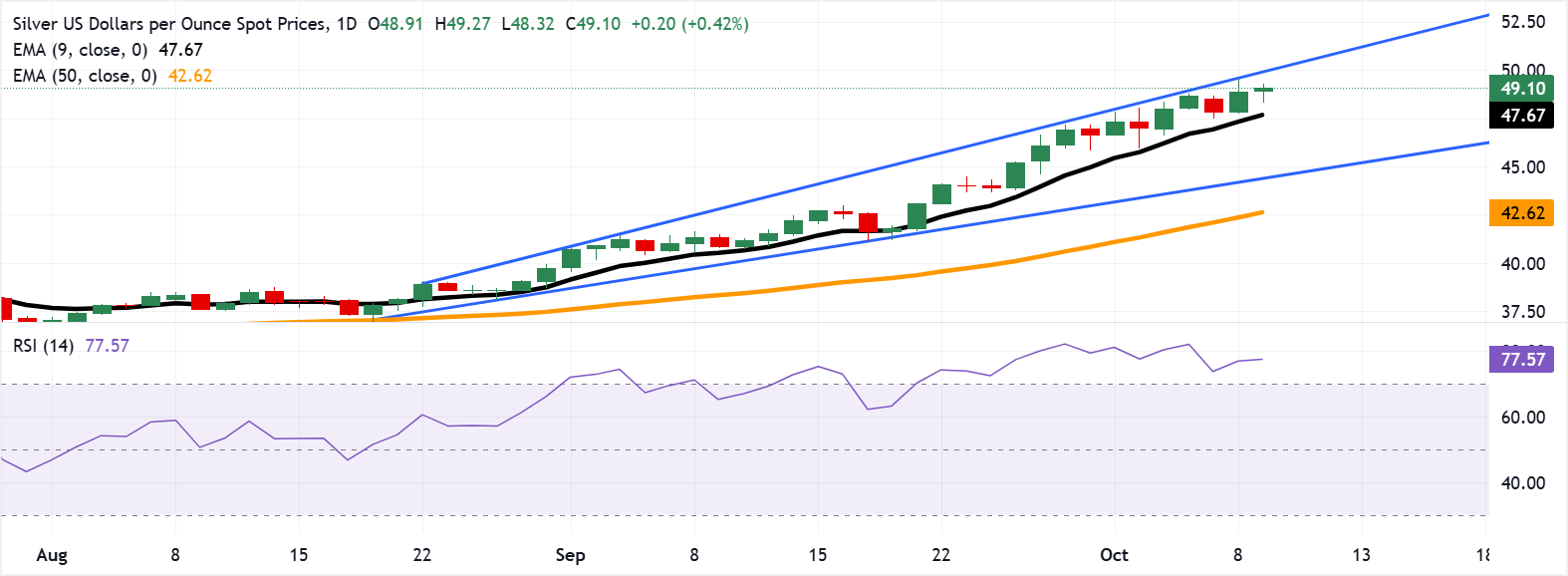Silver Price Forecast: XAG/USD remains above $49.00 due to prevailing bullish bias
- Silver price may test the new all-time high of $49.55 reached on Wednesday.
- The 14-day Relative Strength Index remains above 70, signaling overbought conditions.
- The initial support appears at the nine-day EMA of $47.66.
Silver price (XAG/USD) extends its gains after registering more than 2% gains, reaching the new 14-year high of $49.55 in the previous session and currently trading around $49.10 during the European hours on Thursday. The technical analysis of the daily chart timeframe suggests the price of the precious metal moves upwards within an ascending channel pattern, strengthening the bullish bias.
Additionally, the XAG/USD pair remains above the nine-day Exponential Moving Average (EMA), indicating that short-term price momentum is stronger. However, the 14-day Relative Strength Index (RSI) is positioned above the 70 level, suggesting that the Silver price is trading within overbought territory and a potential for a downward correction.
On the upside, the XAG/USD pair may surpass the new all-time high of $49.55 to test the upper boundary of the ascending channel around the psychological level of $50.00. A break above the channel would strengthen the bullish bias and lead the Silver price to explore the region around the crucial level of $51.00.
Silver price may find its initial support at the nine-day EMA of $47.67. A break below this level would weaken the short-term price momentum and put downward pressure on the Silver price to navigate the region around the ascending channel’s lower boundary at $44.60. Further declines below the channel would dampen the bullish bias and put downward pressure on the XAG/USD pair to reach the 50-day EMA of $42.62.
XAG/USD: Daily Chart

Silver FAQs
Silver is a precious metal highly traded among investors. It has been historically used as a store of value and a medium of exchange. Although less popular than Gold, traders may turn to Silver to diversify their investment portfolio, for its intrinsic value or as a potential hedge during high-inflation periods. Investors can buy physical Silver, in coins or in bars, or trade it through vehicles such as Exchange Traded Funds, which track its price on international markets.
Silver prices can move due to a wide range of factors. Geopolitical instability or fears of a deep recession can make Silver price escalate due to its safe-haven status, although to a lesser extent than Gold's. As a yieldless asset, Silver tends to rise with lower interest rates. Its moves also depend on how the US Dollar (USD) behaves as the asset is priced in dollars (XAG/USD). A strong Dollar tends to keep the price of Silver at bay, whereas a weaker Dollar is likely to propel prices up. Other factors such as investment demand, mining supply – Silver is much more abundant than Gold – and recycling rates can also affect prices.
Silver is widely used in industry, particularly in sectors such as electronics or solar energy, as it has one of the highest electric conductivity of all metals – more than Copper and Gold. A surge in demand can increase prices, while a decline tends to lower them. Dynamics in the US, Chinese and Indian economies can also contribute to price swings: for the US and particularly China, their big industrial sectors use Silver in various processes; in India, consumers’ demand for the precious metal for jewellery also plays a key role in setting prices.
Silver prices tend to follow Gold's moves. When Gold prices rise, Silver typically follows suit, as their status as safe-haven assets is similar. The Gold/Silver ratio, which shows the number of ounces of Silver needed to equal the value of one ounce of Gold, may help to determine the relative valuation between both metals. Some investors may consider a high ratio as an indicator that Silver is undervalued, or Gold is overvalued. On the contrary, a low ratio might suggest that Gold is undervalued relative to Silver.
